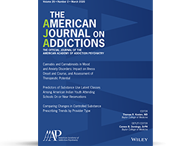Launch of the Center for Addiction Recovery Support (CARS)
The Substance Abuse and Mental Health Services Administration’s (SAMHSA’s) Office of Recovery, in partnership with One World Recovery Network (OWRN), launched the Center for Addiction Recovery Support (CARS). CARS is ready to provide essential training and technical assistance (TTA) to help organizations better provide recovery supports to individuals facing substance use and co-occurring mental health challenges. [Learn more]
Integrating Behavioral Heath Publications Available
SAMHSA has issued two new papers on integration of behavioral health care in specialty care settings such as oncology and gastroenterology clinics. One paper focuses on care for adults and the other pediatric populations. The two papers discuss examples of integrated care models, key components of integrated care models and examples. The goal of these papers is to help ensure patients in these specialty care settings have access to behavioral health care. [View resources]
Clinical Advisory: Considerations for Genetic Testing in the Assessment of Substance Use Disorder Risk.
The potential for substance use disorders (SUDs) to occur is multifaceted – SUDs are products of genetic, biologic, and environmental influences. SUDs occur in individuals from all educational and socioeconomic backgrounds, and long-term vulnerability is mediated by a complex interplay of genes, environmental impacts, and biopsychosocial factors. This Advisory examines the role of genetic testing in assessing SUD vulnerability and outlines the current limitations of these technologies. Access the Advisory here.
And finally… A blast from the past. SAMHSA’s 2024 releases:
- Guidance to States and Communities on Using Federal Funding to Support Mental Health Services for LGBTQI+ Youth
- Preventing Substance Use Among Young Adults with Disabilities
- Practical Guide for Expanding the Community-based Behavioral Health Workforce
- Evidence-Based Guide: Suicide Prevention Strategies for Underserved Youth
- Advising People on Using 988 Versus 911: Practical Approaches for Healthcare Providers



